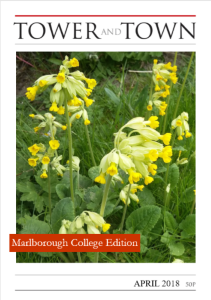

Tower and Town, April 2018 (view the full edition) (view the full edition)Form - A Different ApproachAbout ten years ago, the College decided to take a fresh look at the curriculum for its first-year pupils (Year 9), called the Shell. With most pupils having spent the previous two years preparing for common entrance exams at prep school, and with GCSEs and A levels to come, a break was needed from the cycle of learning for examinations. Pupils should have a chance to explore rather than listen, and discover rather than be taught. It was also felt that there was a need to dismantle the often arbitrary distinctions between subjects, particularly in the humanities, and try to encourage pupils to see human experience as a connected whole rather than divided into discrete disciplines called English, history, philosophy etc. So, after a year of planning, English, history and religious studies were removed from the timetable and one third of the Year 9 curriculum was given over to a different kind of subject called, simply, Form. Pupils were placed in groups of no more than 12, with a Form teacher whom they would get to know extremely well during their first year. This would also have pastoral advantages and help pupils make the jump from a small junior school to large senior school. Covering the combined subject content of those three disciplines also meant that the teacher was necessarily not a specialist in at least two of them, and would therefore be forced to learn the topics alongside the class, rather than teach from the front. What topics would be explored was left up to the teacher and instead, a list of 15 core skills became the basis for planning each Form's scheme. These included promoting reading, use of the library, and developing literacy and oral skills; engaging pupils with the historical concepts of cause and effect, and change over time; considering current affairs, notions of identity, and getting pupils to reflect on fundamental questions, exploring religious and philosophical ideas and the spiritual dimension to life. For teachers, this was a challenging prospect. Having got used to being the person in the room who knew the answers, we had to put ourselves back in the position of the pupil. As an English specialist choosing to explore the French Revolution, I had to stand in front of the class and admit that I couldn't teach the topic. 'If we're going to study the French Revolution, what do we need to find out? What are the important things to know about the revolution, and why? Where are we going to find the information, and how will we check that it's reliable?' Unlike examination subjects, Form is not taught. The teacher devises a scheme covering significant areas of history, religious belief, philosophy, sociology, literature and the arts, and then explores them with the pupils in ways that encourage independent learning, collaboration and discussion. Pupils have to take responsibility for finding and learning information themselves. They teach each other, debate, argue. They give presentations and write projects; they go on visits and reflect on their responses and experiences. They never ask, 'Is this on the syllabus?' because everything in the area of human experience is potentially of interest and therefore relevant. During the last four years, every Shell pupil has been paired with one of the 749 Old Marlburians who lost their lives in The Great War and in the week marking the centenary of that young man's death, have researched his life at the College and at war, presented information about him to the year group and planted a cross in his memory as part of the weekly assembly. In the summer term, the pupils' progress is assessed by an individual creative or research project on a topic of their choosing, accompanied by an oral presentation reflecting on what they have learned from the experience. The year ends with the Form Festival, lasting two days, when pupils are offered a wide choice of artistic, creative and scientific challenges ranging from making a short film to determining whether the spire of the College chapel or the tower of St Peter's is the higher, using only trigonometry. We feel that the experiences of Form help shape pupils' attitudes to learning and they enter the GCSE years better prepared to approach difficulties by themselves and less reliant on their teacher for every answer. The Form project also provides an early experience of independent research, helping them with the more sophisticated tasks demanded later in their school and university careers. Above all, it is a year of school learning that pupils, almost universally, enjoy and which encourages an open-minded, curious and questioning approach that should help them throughout their lives. Andrew Gist |